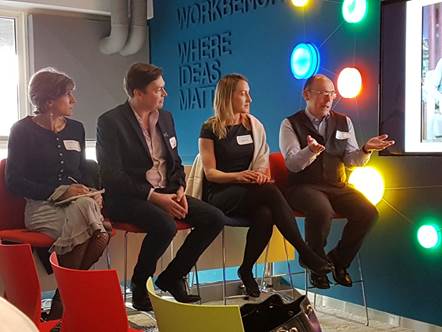Creating exceptional customer experiences takes time and effort. But research and experience tells us that if you create and sustain great experiences for your customers, it reaps significant rewards for your business: enhancing and differentiating your brand, reducing churn, increasing revenue and employee satisfaction.
So how do we use service design to innovate? This was the subject of recent talk organised by the Irish arm of the Customer Experience Professionals Association (CXPA).
According to Dr Peter Robbins, one of Ireland’s foremost experts in innovation and new product and service development, there is no Third Secret of Fatima or silver bullet to innovation. Rather it’s about stacking the tools so that they work in your favour. In fact innovators these days have more in common with artists. Innovators want to create something that doesn’t currently exist. Creating something new – whether that’s a product, a service or a work of art – requires imagination, inspiration and creativity. Before anything comes into being it first has to be imagined.
Imagining and bringing something new into being requires us to move out of our comfort zone, to accept the risk of failure and also the exhilaration of going where no one has gone before. It means working with ambiguity and uncertainty when many people prefer routine, predictability and security so negotiating for resources and creating the conditions and time to innovate can be difficult. Strong leadership is needed to drive the innovation agenda, to leverage foresight and drive change. And that’s just for incremental innovation where customer-centric organisations use service design to keep pace or move very slightly ahead of customers’ evolving needs. Two year insurance from Blue Insurance and Nivea for Men are examples of successful incremental innovations.
So called ‘black swan’ disruptive innovations such as the telephone, television and GPRS in the old days, or the i-Pod, Netflix and Google Maps today can make incremental innovations obsolete and transform entire business models and industry sectors in a nano-second.
So what to do? Should business focus on incremental or radical, disruptive innovation?
If we learned from innovation leaders like Google, we would spend 70% of our budgets on core incremental innovation with the balance dedicated to identifying that potential disruptive transformer.
Peter acknowledged that although it’s difficult, organisations need to be strong at all three phases of innovation:
- Origination: This phase is arguably the most important. Mediocre ideas will not yield results irrespective of the amount of time and effort put behind them.
- Idea Conversion: Organisations need to have a mechanism for sifting and prioritising ideas to identify those to be implemented. There are dangers when key internal stakeholders engage in politics and some ideas can travel further than warranted. In these situations a formal, transparent idea assessment procedure is essential.
- Idea diffusion: The last and key stage is launching the product or service and delivering it successfully to the delight of customers in the marketplace.
Thankfully there are tips to guide progress.
Robbins introduced us to the PDMA – Product Development Management Association. It undertakes longitudinal research which identifies the ways successful companies work to create their success.
Strategy: Service design is an instrument of strategy, a way to connect the boardroom to the day-to-day experiences of customers. The identity you seek to project is, indeed, the face your customers see. Kenny Jacobs’ ‘Always getting Better’ programme for Ryanair is a case in point. In 2013 when Ryanair began its transformation to improved customer-centricity, the airline stayed true to its rock-bottom-price value proposition while improving the customer experience. The airline was chasing not customers’ minds rather than their hearts. “I don’t want customers to say, ‘I love Ryanair,’” says Jacobs. “We want people to say, ‘this is a commoditised, functional experience getting from Dublin to London, from London to Madrid.’
Process: Robbins also highlighted the importance of innovation management but emphasised that the process must always be the servant of the outcome – good ideas must always win out.
Culture: Successful organisations also need to reward their innovators when they challenge the status quo and swim against the tide of ‘the way we do things around here’. Supporting managed risk is key.
Research: Design thinking is essentially a method for meeting people’s needs and desires in a technologically feasible and strategically viable way that makes life easier for the customer and reduces cost for the business. Therefore it is essential that it is always informed by the voice of the customer. Einstein said if we knew what we were doing we would not have called it research. Whatever we do has to be congruent with the overall trends in the world and what customers think and feel is at the heart of that.
Design thinking today is where STEM was in the 90s. The Department of Jobs, Enterprise and Innovation are of the view that that it can help ‘Brexit-proof’ our SMEs and ‘Trump-proof’ our FDI. The strong engagement in the room and lively panel discussion after Peter Robbins talk underlines that many practitioners agree.
Peter Robbins from NUI Maynooth was talking at a CXPA Ireland event.
CXPA (Customer Experience Professionals Association) Ireland is the Irish chapter of the global CXPA organisation that comes together to promote and develop Customer Experience best practice. As a rapidly growing organisation we are keen to welcome new members and anyone with an interest in CX to become involved. Please contact the CXPA here at cxpaireland@gmail.com to join.
W5 works with leading organisations to transform their customer experience, enabling them to deliver their brand promise every day, in every way.
If you are interested to learn more about how we can help you deliver consistently excellent customer experience, contact our team at (+353) 1 4973400 / info@W5.ie or Managing Director Tim Farmer at tfarmer@w5.ie



